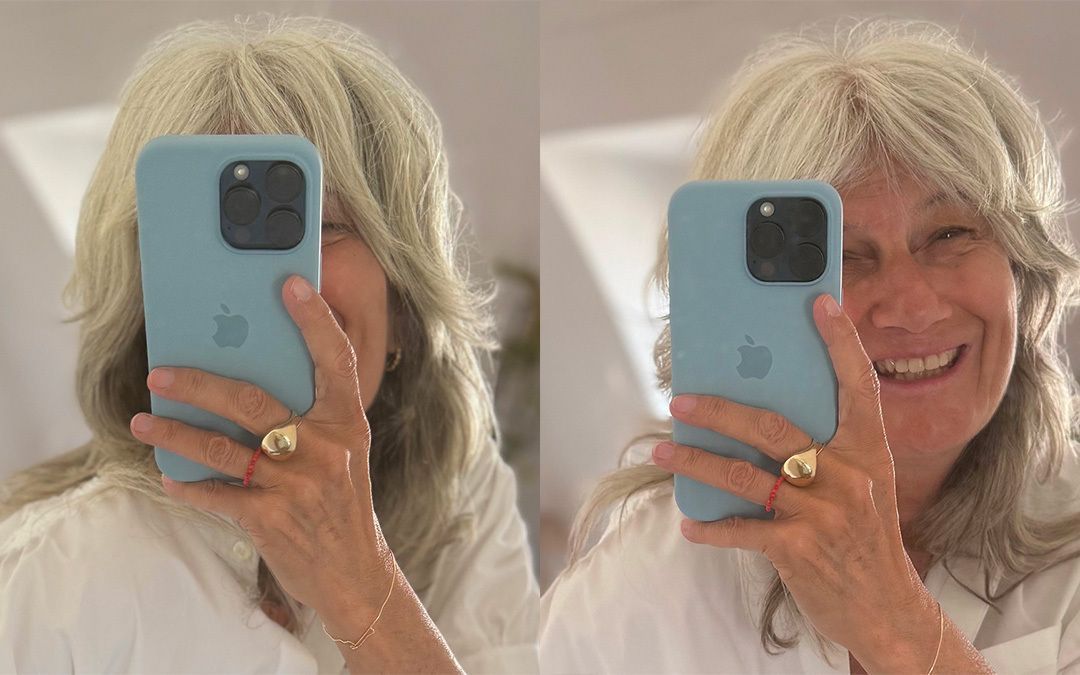
With shiny grey hair resembling sun-drenched mother-of-pearl, her face covered by a smartphone reflected in her home mirror and an eloquence that has led her from the pages of Elle to write sixteen novels, summarising Sophie Fontanel's 61 years of life is a complex business, yet outlining the characteristics that have made her an icon is quite simple. Between effortless chic outfits and very little make-up - in line with Parisian fashion - Fontanel has won the loyalty of her 367,000 followers by remaining true to herself and having the courage to express herself on themes that have redefined the narrative around being a woman in contemporary society. From the choice of sporting her hair au naturel (long before ‘silver hair’ became a trend), to the courage of talking on personal issues such as abstinence, Fontanel shows how liberation through sex can also lie in not doing it, if you don't want to. The conversation quickly delved into the heart of the matter, touching on points that remain largely unexplored to try and find a meaning for all the women who have chosen a career in fashion and culture, and who sometimes feel a little lost.
By taking selfies covering your face but showing your outfit, you have established a new social language. Was this by chance or does this mode of self-representation of yours conceal a message?
The decision to hide my face was the result of several intuitions. The first was recognising that the somewhat blank look of most influencers was not inviting. The second was realising that the emphasis should be on attitude, not face. Attitude is the key to everything. It is the real lesson - perhaps the only lesson - in fashion. The third was to turn my white hair into such a signature that you don't even have to see my face to recognise me.
In your book ‘The Vocation’, you compare your life path with that of your grandmother who had to leave her homeland, Armenia. How did her story influence you and what was it like to come into contact with a culture so different from the one you grew up in? Do you think this has influenced your relationship with fashion?
My Armenian grandparents lived in Turkey, the country of their ancestors, when terrible circumstances - a genocide - forced them to flee. There was a story in my family that my mother, on the exodus boat, hid a 1926 Vogue cover showing a woman dressed in Chanel in front of a car, absolute luxury. My grandmother said: « Of course, we had to flee the massacres and we are refugees. But we are going to France, the country of Coco Chanel ». And this somehow alleviated, crazy as it may sound, some of her pain (her father had been hanged by Turkish militias). I talked about different cultures and you are partly right: my grandmother was from another world, but she still knew about Chanel.
What is your first memory of your grandmother?
The expression she made the first time she found out that it was OK to wear white rather than black.
Through your grandmother's experience, you came into contact with the generational trauma of war and emigration, a topic that is now more important than ever. How has this awareness influenced your view of society and life?
My grandfather's surname disappeared from the face of the earth. I was told that this meant that many people in my family had died in the genocide. When you have no roots, it is of course terrible, but it is also a crazy freedom that life offers you. Of course, the price to pay is high. However, I see the kind of opportunity this situation represented for my mother and her sisters, who were born far from any ancestral social norms. Everything had to be reinvented, it was necessary to integrate and at the same time carry the pride of one's origins. So yes, in France, the first generation of immigrants lived in a certain community, but by the second generation (my mother's, born in Corfu, Greece, during the exodus) it was already a matter of marrying into French culture. Through the language that my mother and her sisters spoke beautifully, through poetry, through books, and all this without losing Armenian culture. Moreover, my family was deeply pacifist. When my mother married my father, who was completely French, they shared the horror of war. They wanted the union of peoples.
You've lived through years of significant transformations around narratives about femininity, you've publicly discussed abstinence and embraced grey hair long before it became a trend. Do you think there are still taboos?
In France, when no one before you has thought of doing something that turns out to be a good idea, they say you have “a boulevard in front of you”. There is no competition. That's a bit of what happened to me. I thought about writing about not making love, then I wrote about what happens when you let your hair grow white. I am surprised that no one thought to tackle these two topics before me, but they did. I wasn't afraid, because I was sure I wasn't alone. And I was not wrong. The mention of 'international best-seller’ is written on the English language version of L'Envie (The Art of Sleeping Alone). Of course, the absence of a sex life or having white hair are still somewhat taboos, but less and less so. And I am proud to have contributed to changing this narrative. People practising abstinence and white-haired women existed long before I talked about it, of course, but they were discreet. I just tried to turn up the volume.
Interview Maria Stanchieri.

